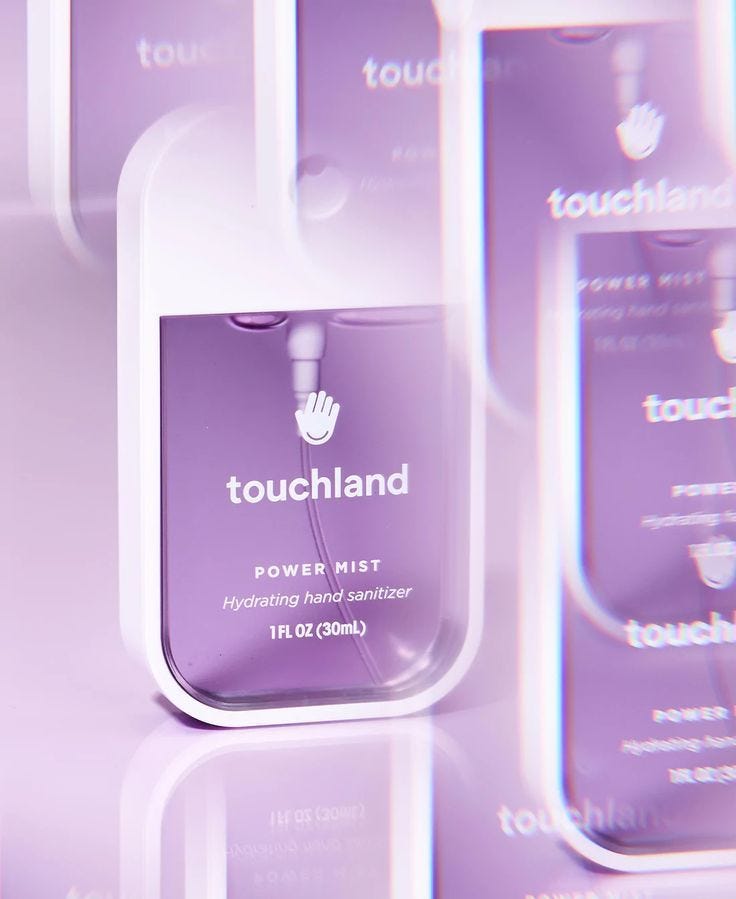I literally just text my group chat:
“Ain’t a pair of clean hands in the WORLD.”
Church & Dwight (Hero Cosmetics, Nair, Batiste and Arm & Hammer) just announced it’s acquiring viral hand sanitizer brand Touchland for $700 million, with an earn-out that could push the deal to $880 million contingent upon 2025 net sales. That’s a lottttta zeros for alcohol, water, and some scented glycerin in a bottle.
Touchland, around since 2018, but not on my personal radar until the pandemic, turned COVID paranoia into a cult-lifestyle brand with their pastel, pocket sized, camera-ready hand sanitizers that set out to “delight our senses and remind us of the magic in the mundane” (as per their website).
When I learned of this acquisition news, I admit my first sentiment was that it felt a little unserious. (The last time I felt this way was with the announcement of The Row’s $1B valuation — give me a break). If you had asked me to do a blind guess, I would’ve put the acquisition at somewhere between $200 million and $400 million, MAX.
I’m not going to completely cut out the fact that Touchland reshaped the category. And while I respect the finesse—a nearly 7x revenue multiple (on $130M in net sales), and a 16x EBITDA for a hand sanitizer brand is…rich. ESPECIALLY in a category that's cooled off post-pandemic.
This news came a day after I was in the checkout at the Beverly Hills Sephora, eyeing a growing Touchland display and wondering how they were still getting away with it.
TIMELINE
Before writing the announcement off as another VC-backed, industry-plant, wool-over-your-eyes success story, I have to admit, I backed off a little when I learned they actually launched with a Kickstarter—raising $67,622 from an original $15,000 goal to bring a sleek, scented hand sanitizer to market.
Touchland didn’t raise real-deal capital until their $1.5 million seed round, ironically closed right before the pandemic hit in February 2020. What followed was a tornado of strong distribution, design-led marketing, and my favorite brand success variable: timing—the brand hitting its stride when sanitizer became a necessity.
In 2021, they raised an undisclosed Series A to stabilize and scale past early business bottlenecks and mounting supply chain issues as well as expanding retail doors, and ramping up customer acquisition while the wave was still cresting.
By 2022, they reportedly achieved a 400% increase in sales—helped along by the aftermath of pandemic panic and the new hand habits people formed in its wake.
And like any digitally native, design-forward brand at the time, Touchland’s aesthetic traveled. It was Instagrammable and had traction in beauty-adjacent spaces. It wasn’t innovative, but it photographed well. And back then that was all it (mostly) took.
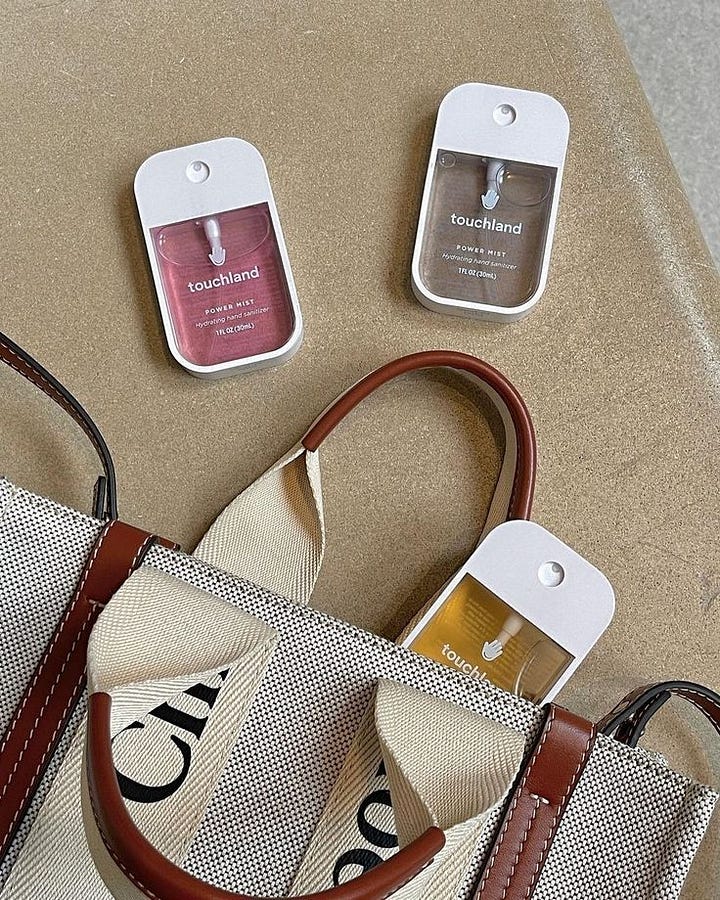
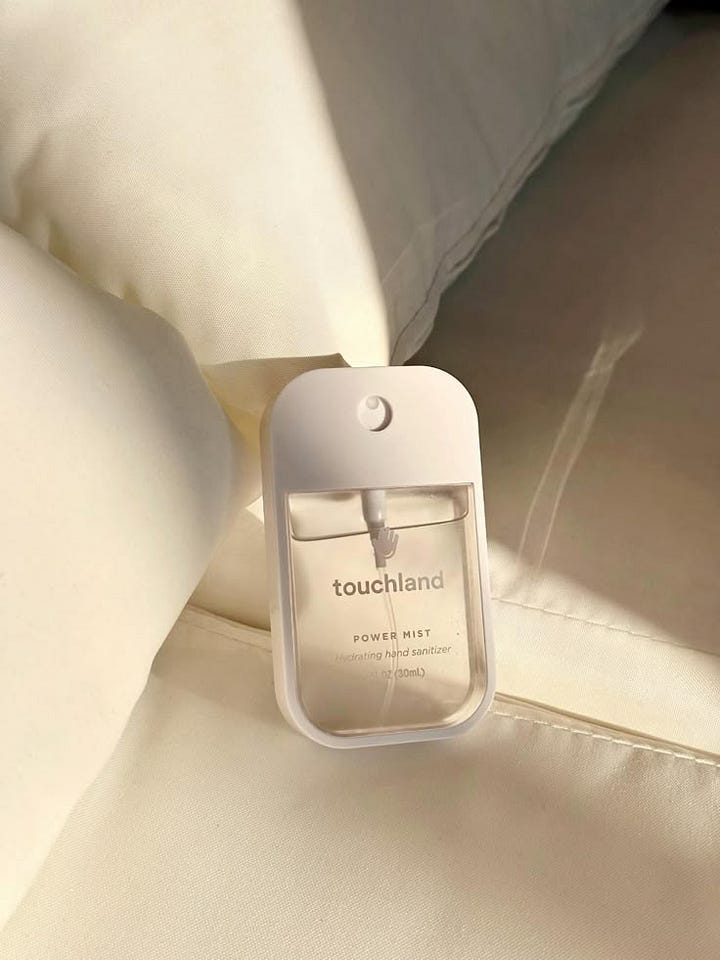
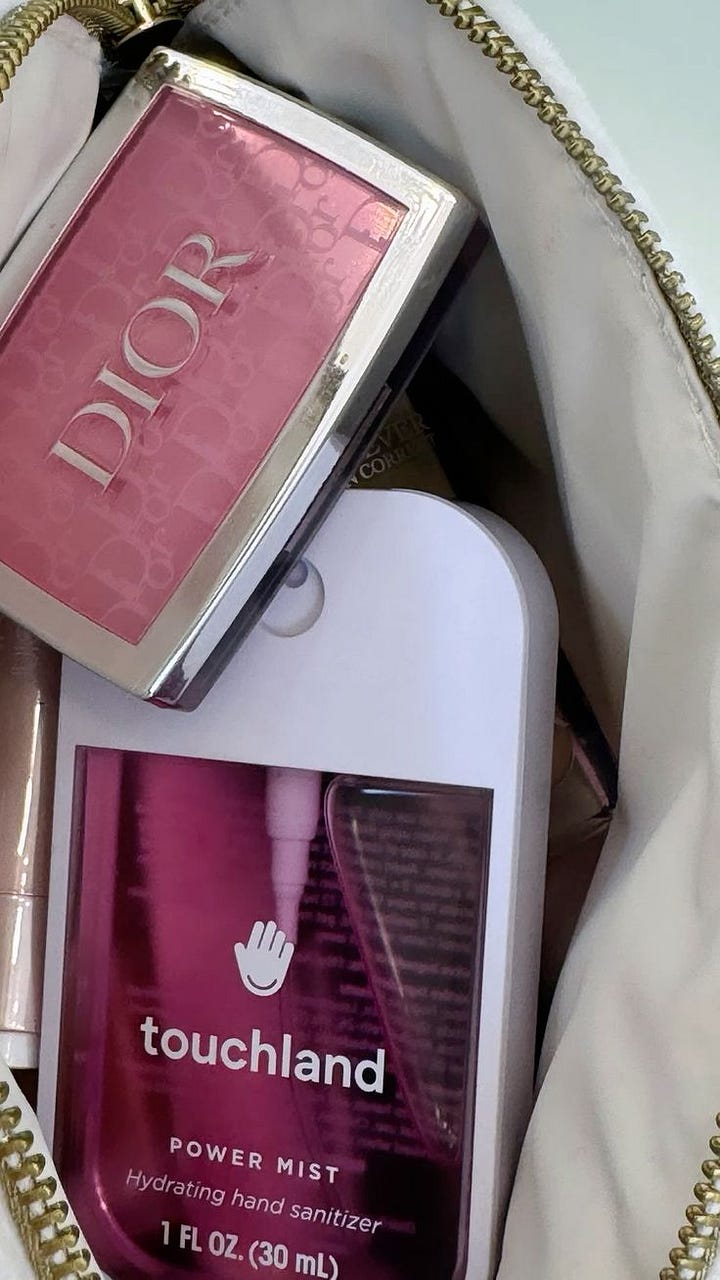
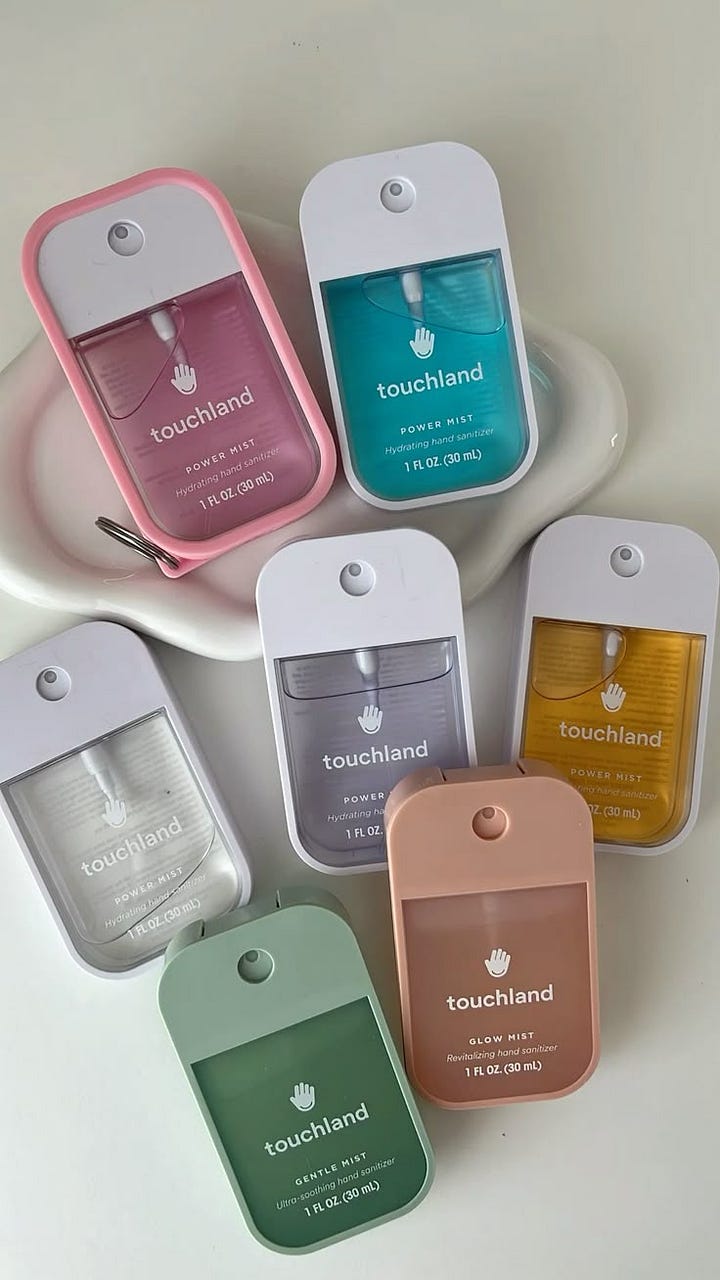
Their product strategy also made scale easier.
With one hero SKU —just in different colors and scent variants, they could easily manufacture at scale, and cheaply, given the low cost of making hand sanitizer.
And while the numbers made it operationally scalable at mass—a gem in the eyes of institutional investors, I’m not sure how the founders were able to justify $24M on a Series B (led by Monogram Capital—the same firm behind investments in Olipop, Vive Organic, and other high-growth, design-forward CPG brands). This is where the what and why’s of who gets funded starts to feel a little disorienting. Echoed in my DMs is a familiar sentiment that speaks to the absurdity of what earns institutional validation.
As a founder friend of mine put it best—low concept ideas require a bunch of money, and at the end of the day it’s about capital it’s not about anything else interesting or meaningful. And it’s true! This deal underscores how far a simple, well-dressed idea can go when it’s backed by capital, proximity, and social fluency—not necessarily ingenuity or brillance.
It’s always shocking to see how many billion-dollar brands are built on the back of basic. That’s the triggering piece for sooo many smart and marginalized founders I know just trying to make it. You’re so caught up solving actual problems, trying to invent something that actually makes life better—and then an acquisition like this comes out and makes you question what the hell you’re even trying so hard for.
(It should).
And listen, as much as I love a little Touchland spritz as much as the next person, the only thing semi-revolutionary thing they offer is the much more sensorial method of delivery.
Touchland does just as great of a job drying my hands out as Purrell.
This isn’t another essay about how marginalized people can’t get funded and how unfair it is and blah blah blah. You know how much I hate all of that shit. In fact, I think Black and female founders should do ourselves a service and stop talking about how much harder it is for us. The truth is nobody cares. We need to get that through our skulls.
BUT.
I do want to make a case for being a little less exceptional. I think a lot of us (especially in my community) are overthinking it! We’re trying to innovate, problem-solve, build things that matter, and I get that! But sometimes it’s just not about smarts; it’s finesse and savvy.
What would happen if we just dialed it back and went off vibes and savvy? Just asking!
One of the best gifts I’ve given myself—to desensitize to the unseriousness of institutional investment—is subscribing to Axios Pro Rata and reading it every morning, just to stay abreast of how much stupid money gets thrown around for dumb ideas. I will say, this kind of acquisition for a CPG brand, in today’s climate feels almost unheard of, if not laughable, but maybe still a little hopeful. Especially as investors have largely taken their eyes off consumer brands, personal care in particular.
Here’s what Touchland pulled off that I want you to takeaway:
You can’t be afraid to spice up the narrative
Even if it feels unbelievable. Investors aren’t funding raw truth and a good samaritan. They’re funding potential, perception, and a positioning. Think of it as going on a first date. Do they present their full selves and expect you to accept them for who they are, or are they leading with a dramatization of their own excellence to win your attention? Exactly.
Touchland’s perception of having built a white space was clearly fundable. The truth is—there’s no product made with 70% ethanol that’s going to hydrate your hands, people! The brand narrative and positioning allowed them to schooch past this.
Make retail your bitch
By 2023, Touchland had multi-retailer dominance. Sephora. Ulta. Target. Neiman Marcus. Airport terminals…they managed to scale a commoditized product across prestige, masstige, and mass, with strong sell-through in nearly every retail environment.
Brand ubiquity will always lead to acquisition readiness.
Product expansion & beauty style distribution
To convince investors, the looking-ahead story is everything. Since the Series B, Touchland has extended beyond sanitizer, most recently with a body mist collection, riding the fragrance boom I’ve touched on in a previous essay. Investors love pushing for future products. That’s why your favorite Sephora brands are always dropping new things by the minute.
Church & Dwight likely sees Touchland as a Trojan horse for launching more SKUs at a high margin, with built-in appeal to attract the next wave of Gen-Z consumers (an audience stakeholders are overly invested in, in my opinion).
I’m not mad at the Touchland founders from benefiting from the game. There is always a piece of me that gets excited for any founder when they get acquired—the ultimate get out of jail card. Who actually does this for shits and gigs, and the love of the game? Idk let me know, but that sounds insane to me.
Going back to the crowdfunding piece—in a way, those origins makes me feel like Touchland founders Andrea Lisbona and Ruggero Grammatico have earned this. I’ve always found crowdfunding to be both the most humiliating and fearless way to ask for money. Any bitch that has the balls to crowdfund lowkey deserves the world.
Bootstrapping to a nearly billion-dollar exit for making hand sanitizer cute (not better). Congrats are in order, I guess.
Cheers,
SF





